Related Research Articles

Kasinadhuni Viswanath is an Indian film director, screenwriter and actor, known for his works primarily in Telugu cinema. He is recipient of five National Film Awards, seven state Nandi Awards, ten Filmfare Awards South, and a Filmfare Award in Hindi. He was honored with the "Prize of the Public" at the "Besançon Film Festival of France" in 1981. In 1992, he received the Andhra Pradesh state Raghupathi Venkaiah Award, and the civilian honor Padma Shri for his contribution to the field of arts. In 2017, he was conferred with the Dadasaheb Phalke Award, the highest award in Indian cinema.

Nandamuri Taraka Rama Rao, often referred to by his initials NTR, was an Indian actor, filmmaker and politician who served as Chief Minister of Andhra Pradesh for seven years over three terms. He starred in over 300 films, predominantly in Telugu cinema, and was referred to as Viswa Vikhyatha Nata Sarwa Bhouma. Rao received three National Film Awards for co-producing Thodu Dongalu (1954) and Seetharama Kalyanam (1960) under National Art Theater, Madras, and for directing Varakatnam (1970). Known for his breakthrough performances in Raju Peda (1954) and Lava Kusa (1963), Rao garnered the Nandi Award for Best Actor for Kodalu Diddina Kapuram in 1970, and the Inaugural Filmfare Award for Best Actor – Telugu in 1972 for Badi Panthulu.

Krishnankoil Venkadachalam Mahadevan was an Indian composer, singer-songwriter, music producer, and musician known for his works in Tamil, Telugu, Malayalam, and Kannada films. He is best known for his contributions in works such as Manchi Manasulu (1962), Lava Kusa (1963), Thiruvilaiyadal (1965), Saraswathi Sabatham (1966), Kandan Karunai (1967), Thillana Mohanambal (1968), Adimai Penn (1969), Balaraju Katha (1970), Athiparasakthi (1971), Sankarabharanam (1979), Saptapadi (1981), Sirivennela (1986), Sruthilayalu (1987), Pelli Pustakam (1991), and Swathi Kiranam (1992).
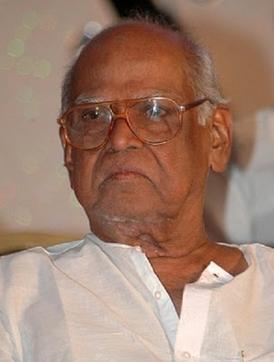
Sattiraju Lakshminarayana, known professionally as Bapu, was an Indian film director, painter, illustrator, cartoonist, screenwriter, music artist, and designer known for his works in Telugu and Hindi cinema. In 2013, he was awarded the Padma Shri, for his contribution to Indian art and cinema. He has garnered two National Honors, two National Film Awards, seven state Nandi Awards, two Filmfare Awards South, a Raghupathi Venkaiah Award, and a Filmfare Lifetime Achievement Award – South.

Akkineni Laxmi Vara Prasada Rao, known professionally as L. V. Prasad, was an Indian film director, producer, actor, and businessman. He was one of the pioneers of Indian cinema and is the recipient of the Dadasaheb Phalke Award, the highest Award for films in India. In 1980, he was awarded the Raghupathi Venkaiah Award, for his contribution to Telugu cinema.

Telugu cinema, also known as Tollywood, is the segment of Indian cinema dedicated to the production of motion pictures in Telugu language, widely spoken in the states of Andhra Pradesh and Telangana. Telugu cinema is based in Film Nagar, Hyderabad, India. The nickname Tollywood is a portmanteau of the words Telugu and Hollywood. By 2021, it has emerged as the largest film industry in India in terms of box-office.
K. S. Sethumadhavan was an Indian film director and screenwriter who worked predominantly in Malayalam cinema. He also directed films in Hindi, Tamil and Telugu.

M. M. Keeravani is an Indian music composer, record producer, singer, and lyricist who predominantly works in Telugu cinema along with a few Hindi and Tamil films. His accolades include a Golden Globe Award, a Critics' Choice Movie Award, a LAFCA Award, a National Film Award, eight Filmfare Awards and eleven Nandi Awards.

Dasari Narayana Rao was an Indian film director, producer, screenwriter, actor, lyricist, and politician known for his works predominantly in Telugu cinema, in addition to Hindi cinema. He has directed more than 150 feature films in a variety of genres. He holds the Limca World Record for directing the most number of films in the world. He is known by the moniker Darsaka Ratna. His works emphasize social injustice, corruption and gender discrimination. Narayana Rao has received two National Film Awards, nine state Nandi Awards including the Raghupathi Venkaiah Award, and four Filmfare Awards South including the Lifetime Achievement. During his career he had also acted in Telugu, Tamil, and Kannada films.
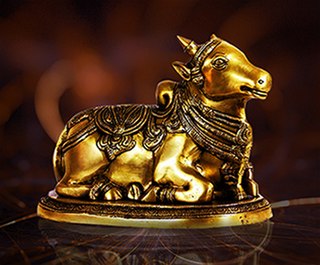
The Nandi Awards are the awards that recognise the excellence in Telugu cinema, Telugu theatre and Telugu television, and Lifetime achievements in Indian cinema. Presented annually by the Government of Andhra Pradesh, the award is named after the big granite bull at Lepakshi — a cultural and historical symbol of the Telugu people.
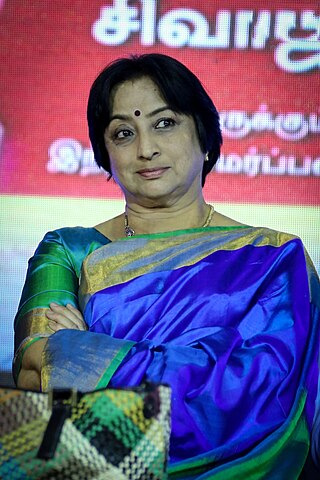
Mahalakshmi, known professionally as Lakshmi, is an Indian actress known for her works primarily in the southern film industry, along with some Hindi films. She made her film debut through a Tamil film Sri Valli in 1961. Her debut as an actress happened with the Tamil film Jeevanaamsam in 1968. In the same year, she also debuted in Kannada and Telugu films with Goa Dalli CID 999 and Bandhavyalu, respectively.
Jayasudha Kapoor is an Indian actress and politician known for her works predominantly in Telugu cinema. She has also worked in few Tamil, Kannada, Malayalam, and Hindi films. Known as natural actress, she received five state Nandi Awards for her acting in works such as Jyothi (1976), Idi Katha Kaadu (1979), Premabhishekam (1981), Meghasandesam (1982), and Dharmaatmudu (1983).
Pasupuleti Ramesh Naidu (1933–1988) was an Indian music composer, multi instrumentalist, and singer, known for his works predominantly in Telugu cinema. He garnered the National Film Award for Best Music Direction for the film Megha Sandesam in 1982. He won three Nandi Awards.

Veeramachineni Madhusudhana Rao was an Indian film director, producer, and screenwriter, known for his works predominantly in Telugu cinema. He is popularly known as ‘Victory’ Madhusudhana Rao. He directed nearly 70 films, including musical hits such as Annapurna (1960), Aradhana (1962), Aathma Balam (1964), Zamindar (1965), Antastulu (1965), Aatmiyulu (1969), Krishnaveni (1974) and produced Swati Kiranam (1992). In 1965 he received the National Film Award for directing Antastulu. Madhusudhan Rao died on 11 January 2012 at the age of 94.
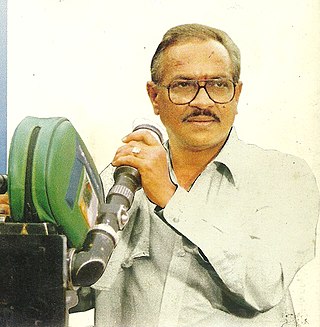
Jandhyala Subrahmanya Sastry, known mononymously by his surname Jandhyala, was an Indian film director, screenwriter, playwright, and actor known for his works in Telugu cinema and Telugu theatre. He is popularly known as Hasya Brahma. In a career spanning more than two decades, he directed over 40 films and wrote the dialogue for more than 300 films. He won three state Nandi Awards one each for Best Director, Best Story Writer, and Best Dialogue Writer and one Filmfare Award for Best Director – Telugu. The Hindu referred to him as the 'King of Comedy in Tollywood'.
Mugur Sundar is a dance choreographer in South Indian cinema.
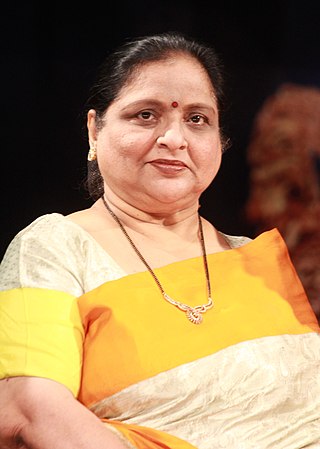
Roja Ramani is an Indian actress who predominantly worked in Malayalam and Telugu films. She was a child actor and her debut movie was Bhakta Prahlada (1967) for which she received National Film Award for Best Child Artist. She was popular during the 1970s and early 1980s and haans acted in Malayalam, Telugu, Kannada and Tamil movies. She worked in 400 films as a dubbing artiste. She is an active member of BlueCross and is involved in several social service activities.
Kamalakara Kameswara Rao was an Indian film director known for his works predominantly in Telugu cinema, and a few Tamil and Hindi films. Widely known as Pauranika Chitra Brahma, Kameswara Rao directed fifty feature films in a variety of genres.

Ashok Kumar Aggarwal was an Indian cinematographer who worked mainly in the South Indian film industry. In a career that spanned nearly four decades, he worked in over 125 feature films in Tamil, Telugu, Malayalam, and Hindi languages. Aggarwal was a member of the Indian Society of Cinematographers (ISC).
Talasila Kranthi Kumar was an Indian film director, producer, and screenwriter known for his works predominantly in Telugu cinema. He won two Filmfare Awards and four Nandi Awards. In 1985, he directed Sravanthi, which won the National Film Award for Best Feature Film in Telugu that year. In 1991, he directed Seetharamayya Gari Manavaralu, which was premiered in the Indian panorama section, at the 1991 International Film Festival of India.
References
- ↑ Telugu Cinema Prapamcham: Harischandrudu (1981)
- ↑ "28th National Film Awards" (PDF). Directorate of Film Festivals . Retrieved 4 October 2011.